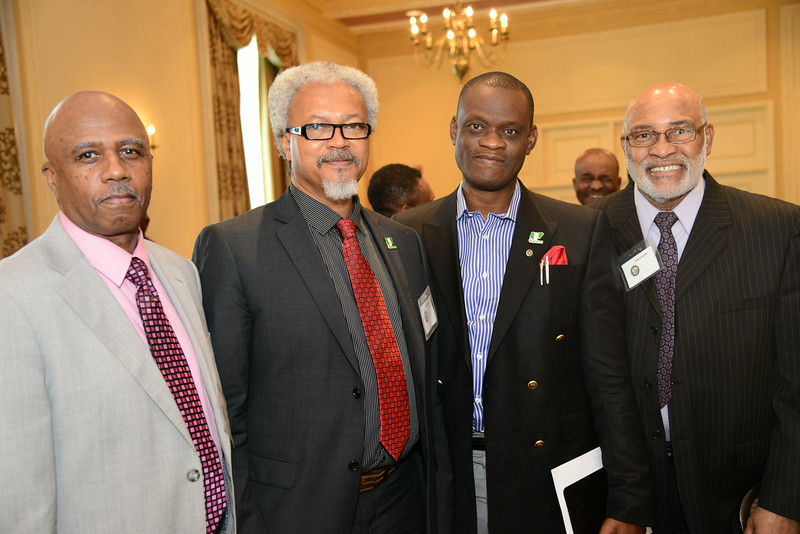
Cyril Claxton of US based eHealth Solutions, and DG of NITDA, Mr. Peter Jack, Engr Wilson Chinedu Agu, a member of NITDA’s board and Joe Williams also of US based eHealth Solutions.
Nigeria’s IT regulatory institution, the National Information Technology Development Agency (NITDA) said it would be engaging Nigerians abroad in the implementation of the country’s ICT Local Content Guidelines.
NITDA’s boss, Mr. Peter Jack, who was speaking at the recent Nigeria Diaspora Information Communication Technology (NIDICT) Conference that held in Detroit, the United States of America, Nigerians in diaspora constituted a major factor in the agency’s new multi-stakeholder partnership approaching at resolving issues as they affect the industry.
The new ICT Local Content Guidelines are designed to promote indigenous ICT entrepreneurship and content in a sector largely dominated by foreign skill sets and products. Under the new deal, indigenous skill sets and products get priority over their foreign competitors.
Jack said he will engage high skilled Nigerians abroad in the Local Content Implementation Board expected to be established soon to help drive the local content process.
“We are creating the enabling environment to foster multi-stakeholder partnerships in developing local content and increase ICT’s contribution to our GDP. Accordingly Nigerians in Diaspora should be willing and ready to participate fully in the development of the action plan for implementation of the Local Content Guidelines,” said Jack to an audience that include public and private ICT operators; regulators; members of Nigerian Foreign Missions in United States of America and Canada; members of Nigerians in Diaspora (NIDO); Original Equipment Manufacturers; and ICT service providers.
The NiDICT conference with the theme: ‘Harnessing Diaspora and Local Linkages for Economic Growth’ was designed as part of Nigeria’s Centenary Celebration to boost developmental and fraternal business relationships in the areas of ICT amongst Nigerians in Canada, USA and Nigeria.
Speakers at the three days conference articulated on the need for Nigerians at home and in Diaspora to collectively focus on progressive opportunities and solutions across all sectors and specifically, in the areas of ICT. They submitted that while Nigeria has made considerable progress to become Africa’s biggest economy in this democratic dispensation, there remains an urgent need to continue the progressive momentum in the area of bolstering technology solutions to address the inherent challenges for economic and nation building.
Most importantly, they canvassed for a thickening of relationships among all ICT stakeholders within and outside the country for the purpose of advancing the cause of local ICT as the example of India has shown. “This conference opens a new chapter in seeing how Nigerians of various skills within specialized ICT areas could collaborate to improve the country and further promote the image of the country,” said His Excellency, Chief Ojo Maduekwe (CFR), High Commissioner of Nigeria in Canada who was represented by First Secretary Mrs. Mary Ozonwanji.
Nigerians in Diaspora occupy a strategic area of importance in building the overall value of Nigeria’s economic development and not only in the ICT space,” said Dr. Akin Awofolaju, President, Nigerians in Diaspora Organisation, USA. Awofolaju said it will be counterproductive to leave out the Diaspora in advancing Nigeria’s economy as the Diaspora represent a formidable pool of skill and experience which Nigeria can leverage on.
Jack who agreed with Awofolaju said it was worrisome that the Diaspora was still not adequately considered a critical resource in national economic development as China and India have been able to achieve. His words: “Despite available evidence on the positive economic impact of Diasporas in various nations across the globe, less attention has been paid concerning their potential roles as meaningful change agents in the social, cultural and intellectual aspects of development.
“With advancements in ICT, a number of Diaspora organizations have been testing new forms of interaction in order to take advantage of the wealth of human resources that exists, and as a result are able to facilitate discussions on the various assistance initiatives that could work in their countries of origin. The ubiquitous nature of ICT has created an opportunity for consistent and thorough knowledge sharing between the Diaspora and home country counterparts, in particular as it pertains to local development.
“As a whole, Diaspora groups frequently play critical roles in accelerating technology exchange and foreign direct investment in their home economies. India through its U.S.-based Diaspora has instigated significant investments back home from multinational companies in the information technology sector. This has enhanced the number of high- skilled jobs especially in India’s software industry thereby strengthening the country’s exports and helping to improve its overall economic growth.”
Jack also canvassed for special incentives in terms of fiscal measures and other supports for Nigerians in Diaspora willing to come back and develop the ICT sector in Nigeria. Delegates at the conference also submitted that a trade/technical delegation consisting of Diaspora ICT experts and potential investors would be both vital and beneficial to the country.
NiDICT which was promoted by Pinnacle International Consulting LLC and Knowhow Media International (KMI), publishers of IT Edge News with the support of the National Information Technology Development Agency (NITDA), the Mayoral Office of the City of Detroit, Galaxy Backbone Limited, the Nigerian Computer Society, and the Nigerians in Diaspora Organisation (NIDO) also focused on Cyber attacks and how the country can checkmate the problems.
“Nigeria is now ranked as the 26th largest economy in the world and is expanding Internet adoption in the major sectors of the economy. Many of the nations’ infrastructure and systems are now interconnected in cyber space. Critical systems including power, water, telecommunications, etc; economic systems including stock exchanges, central/reserve banks, financial institutions, etc; e-services such as tolling systems, online booking systems, etc; are all getting increasingly fully interconnected. This paradigm shift of interconnected systems makes ICTs susceptible to Cyber attacks of unforeseeable impact. Cyber Attacks are increasingly and understandably on the rise. Nigeria could experience three faces of Cyber security namely: Organized Cyber Crime; Organized Cyber Terrorist Groups; and Organized Nation States Cyber Attacks”, said Dr Charles Iheagwara, Managing Director of US based Unatek, Inc.
Part of the submissions of the Communiqué reads:
“Nigeria should create her Cyber Security Development Priorities to underscore the need to establish partnerships with businesses, research and tertiary institutions;
“There is need to establish a National Center of Excellence for Cyber Security to Encourage Cyber Security Technology Transfer & Commercialization;
“There is need to Enhance Nigeria’s Information Standards, Certification & Testing Capabilities; and Align Nigeria’s Education Programmes to Meet Demand for Cyber Security Talent; and
“It is desirable to Develop Workforce Training Programmes to address ICT Industry Needs’ and also create a Multi-Faceted Communications & Marketing Strategy to Increase Public Awareness on Cyber Security and other Critical ICT Needs.

































